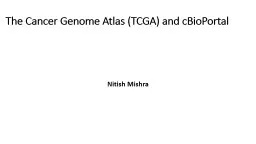PPT-The Cancer genome atlas (TCGA) and the search for a CUP genetic/epigenetic signature
Author : stefany-barnette | Published Date : 2020-01-06
The Cancer genome atlas TCGA and the search for a CUP geneticepigenetic signature Manel Esteller MD PhD Director Josep Carreras Leukaemia Research Institute IJC
Presentation Embed Code
Download Presentation
Download Presentation The PPT/PDF document "The Cancer genome atlas (TCGA) and the s..." is the property of its rightful owner. Permission is granted to download and print the materials on this website for personal, non-commercial use only, and to display it on your personal computer provided you do not modify the materials and that you retain all copyright notices contained in the materials. By downloading content from our website, you accept the terms of this agreement.
The Cancer genome atlas (TCGA) and the search for a CUP genetic/epigenetic signature: Transcript
Download Rules Of Document
"The Cancer genome atlas (TCGA) and the search for a CUP genetic/epigenetic signature"The content belongs to its owner. You may download and print it for personal use, without modification, and keep all copyright notices. By downloading, you agree to these terms.
Related Documents














